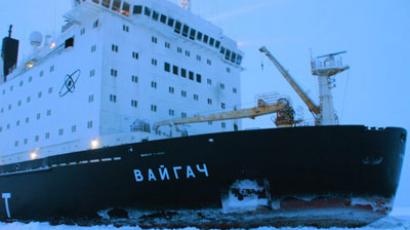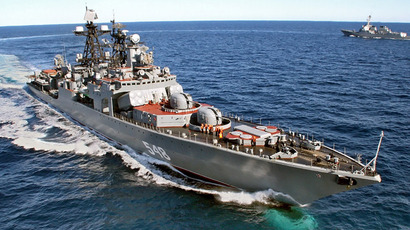Russia to expand Mediterranean fleet to 10 warships – Navy chief
The Russian Navy intends to build its presence in the Mediterranean Sea - particularly in the area close to Syrian shores - to up to 10 battleships, announced Admiral of the Fleet Viktor Chirkov.
“The task is crystal clear: to avoid a slightest threat to the security of the state. This is a general practice of all fleets around the world, to be there when a tension level increases. They are all going to act on operational command plan of the offshore maritime zone,” Chirkov told journalists on Friday. "Russia will be building up its Mediterranean fleet until it is deemed sufficient to perform the task set."
Russia began military build-up in the Mediterranean in 2012, and starting from December last year the Navy established a constant presence in the eastern part of the Mediterranean Sea.
On May 1, 2013 all Russian battleships operating in the area were assigned to a single task force under special offshore maritime zone operation command.
Currently there are seven warships deployed in the area: landing craft carriers 'Aleksandr Shabalin’, ‘Admiral Nevelskoy’, ‘Peresvet’, ‘Novocherkassk’ and ‘Minsk’ from Russia’s Black and Baltic Sea Fleets, as well as the escort vessel ‘Neustrashimy’, and large anti-submarine ship ‘Admiral Panteleyev’.

According to previous reports, the missile-carrying cruiser ‘Moskva’ passed the Straits of Gibraltar on September 10 and is expected to arrive at its final destination in eastern Mediterranean on September 15 or 16.
Two battleships of the Russia’s Black Fleet, guided missile destroyer ‘Smetlivy’ and landing craft carrier ‘Nikolay Filchenkov’ left their bases in Sevastopol and Novorossiysk respectively and early on Friday morning have passed the Bosphorus Strait, heading to the eastern Mediterranean.
The SSV-201 reconnaissance ship ‘Priazovye’ also reportedly joined the group in the Eastern Mediterranean in early September.
Upon the arrival of the ‘Moskva’, its commander, Sergey Tronev, will assume operative command of the task force.
Commander Admiral Viktor Chirkov also informed that more than 80 Russian battleships and support vessels are currently offshore in various parts of the global ocean.
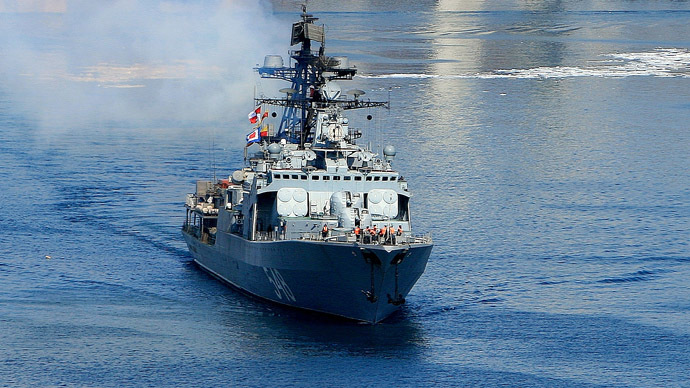
“In time of peace Navy’s duty and main application is military service, constant naval presence in the zones of military-political tension where interests of the Russian Federation are concentrated,” Chirkov said.
Admiral Chirkov recalled that a group of ships headed by the ‘Moskva’ missile cruiser recently called into ports of Cuba and Venezuela and for the first time ever passed into the Pacific Ocean via the Panama Canal, calling into ports in Nicaragua and Panama.
Chirkov also informed that a group of 10 warships and support vessels accompanied by four nuclear icebreakers right now are training on the Northern Sea Route. This task group is headed by Russia’s most powerful battleship and the flagship of the Northern Fleet, cruiser ‘Pyotr Veliky’ (Peter the Great).
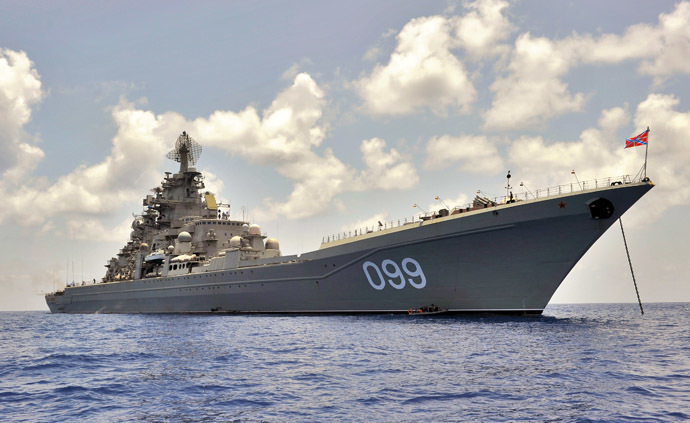
“For the first time ever all Russia’s nuclear surface ships - heavy nuclear missile cruiser ‘Pyotr Veliky' and nuclear icebreakers ‘Yamal’, ‘Vaigach’, ‘Taimyr’ and ‘50 Let Pobedy’, were combined in to perform a joined task,” Chirkov said, adding that the icebreakers assisted the taskforce to pass the strait between the Taimyr Peninsula and the Severnaya Zemlya Archipelago, and now the group is continuing to move forward to the east, crossing the Laptev Sea.
Chirkov also mentioned that a group of battleships of the Pacific Fleet headed by the missile cruiser ‘Varyag’ is currently deployed in the southern-western Pacific performing an operational readiness exercise.
“This group will take part in international exercises of the naval forces of the countries of the Asia-Pacific region and later will take part in the centenary celebration of the [Royal] Australian Navy,” said Chirkov.
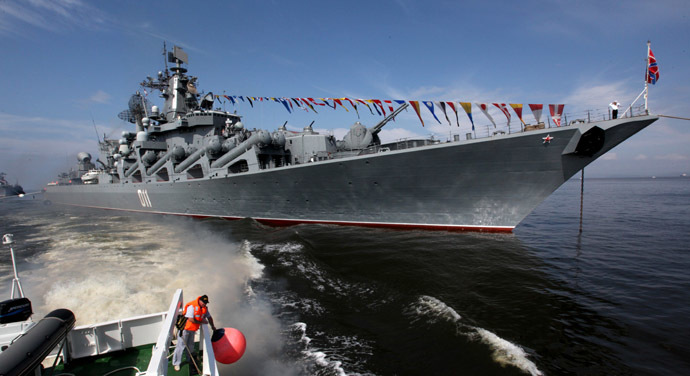
The Russian Navy also continues to battle maritime piracy, deploying task force groups off the coasts of Somalia. In 2013 two naval task groups, one from the Northern Fleet and another from the Pacific Fleet, have been protecting sea routes near the Horn of Africa.
Russian warships accompanied 19 convoys through the dangerous waters, maintaining security of 105 vessels from 27 countries and once preventing capture of a merchant vessel.













